
Volume XX, Issue III: Building in Tumultuous Times
The Ministry of Building Things
I'll bet if I asked you to think of some different types of ministry and ways to build the Kingdom of G-d, you probably wouldn't think of Economic Development. Pastor Tim Keller, in his book: Resources for Deacons, sees it clearly as a part of the Diaconal ministry. Our church helps women in Zambia get sewing machines. To be sure, the gift of the ability to earn their living as seamstresses is an act of ministry to these ladies.
But think bigger! THYME presents the story of how a nation turned from a great evil and one city suffered greatly in doing so. G-d provided a provider! Then G-d provided provision for the provider by inspiring great innovation that came to revitalize that great city. Should we dare to pray for such innovation and inspiration in our own day?
Isambard Kingdom Brunel
What a Nineteenth Century Innovator Can Teach Us Now
© 2013 The Kirchman Studio, All rights reserved.
They say that the condition for a miracle is difficulty, but the condition for a great miracle is impossibility” -- Angus Buchan, “G-d's Farmer”
When William Wilberforce [1.] had ended the slave trade in the British Empire, he had thrown the city of Bristol, England into economic depression. The port there was heavily devoted to that wretched business and suffered heavily when it was brought to a sudden halt. The unintended consequence had been a rise in children condemned to a life of poverty. Ending the vile business of enslaving Africa's children had resulting in England's society spurning the needs of her own. Into this world came George Müller [2.], who, relying on faith in G-d alone, provided redemption for thousands of orphans. Many of these children were cast-offs of a society in economic despair.
George Müller [3.] had seen the wretched street urchins most people despised as jewels to be polished. Muller, relying solely on Divine provision, built five large houses for Orphans at Ashley Downs in Bristol, England. He trained the girls to be nurses, teachers, clerical workers and domestics. He apprenticed all the boys in various trades. He was excoriated for training these unwanted children "above their station." He ignored the critics.
Müller looked to G-d alone, but Bristol needed an outfowing of Divine provision to provide for her children. G-d's provision for Bristol was to come in the form of inspiration and innovation, embodied in the work of a young pioneer of civil engineering. He also ignored his critics.
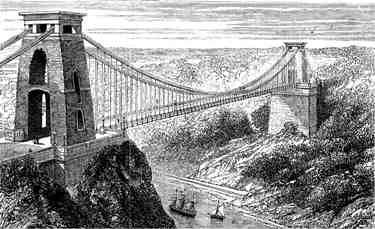
Brunel's Clifton Suspension Bridge became the symbol of the City of Bristol.
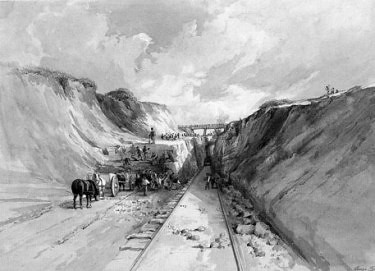
Building the Great Western Railway.
In 1831, 24 year old Isambard Kingdom Brunel [4.] was awarded a contract to bridge the Avon Gorge. It was the dream of a prosperous wine merchant who provided the initial funding. The completed bridge would become the symbol of the city, but lack of funding dogged the project. It took thirty years to complete it. For years only the towers stood completed. In 1833 Brunel began work on the Great Western Railway, which would become the instrument of Bristol's economic revitalization. The nicknames: "Great Way Round" and "G-d's Wonderful Railway" seem to describe well Brunel's great work.
Brunel was an innovator. He probably experienced as many failures as successes in his short lifetime. Born on April 9, 1806, the son of Sir Marc Brunel, he assisted his father in building a tunnel under the Thames. He would later become the resident engineer of that project. At twenty years of age, he designed a suspension bridge to cross the Avon river. A modified version of his plan was actually constructed.
At 26, Brunel was building the Great Western Railway, commissioned to maintain Bristol's importance as a port and position her for trade with America. This wide-gauge railroad linked Bristol and Western regions of England to London. Bristol's prosperity as a port was assured and the work of Müller created solid citizens with strong spiritual foundations to benefit.
But Brunel was not content to simply build a better railway. He looked across the Atlantic, envisioning fleets of ocean greyhounds -- great steamships that would complete the linking of his Great Western Railway to America! The S. S. Great Britain was his creation. It was the first metal-hulled propeller-driven ocean ship and became the prototype for modern ocean liners.
Building the South Devon Railway as a spur to the Great Western, Brunel experimented with an alternative to steam engines -- Vacuum tube powered trains. Stationary vacuum plants evacuated tubes laid along the center of the track that powered the movement of trains.

Brunel's 'Atmospheric Railway.'
The technology required the use of leather flaps to seal the vacuum pipes. The natural oils were drawn out of the leather by the vacuum, making the leather vulnerable to water, rotting it and breaking the fibres when it froze. It had to be kept supple with tallow, which is attractive to rats. The flaps were eaten, and vacuum operation lasted less than a year, from 1847 (experimental service began in September; operations from February 1848) to 10 September 1848.[45] It has been suggested that the whole project was an expensive flop. In Brunel's favour, it has been noted that he had the courage to call a halt to the venture instead of struggling on with it at greater cost." -- Wikipedia
Like alternative transportation prototypes of our day, the vacuum tube system was more expensive. The accounts of the SDR for 1848 show that atmospheric traction cost 3s 1d (three shillings and one penny) per mile compared to 1s 4d/mile for conventional steam power.Though considered a failure at the time, vacuum powered trains may have been a distant precursor to Evacuated Tube Technology [5.] which is now being developed to move entire transport capsules through large tubes -- essentially powered in the same way as Brunel's South Devon train. Brunel was simply two Centuries before his time on this.
What can we learn from Brunel today? Plenty! Inspiration and innovation are needed now as they were needed then. Brunel teaches us valuable lessons about expanding vision with proven technologies and wisely exploring alternatives (and abandoning them when they do not work as planned).
Praying people see the diaconate role of economic development as an integral part of G-d's provision. In “Resources for Deacons, Love Expressed Through Mercy Ministries,” [6.] Tim Keller states his belief in three “levels” of mercy in diaconal ministry:
The first Level Is Simple Relief: That is taking care of the immediate need.
The Second Level Is Economic Development: That is teaching the poor how to get out of poverty by teaching them how to handle money, property, etc. and furnishing them with the means to do so. “Not handouts, but ownership is the way to break the cycle of poverty.”
The Third Level Is Social Reform: Christians should be involved in the culture in an effort to change the social structure.
We see it very localized in a place like Zambia, where people of faith instruct widows to become seamstresses (and people in America gift them with sewing machines). But, can we believe G-d for ever greater inspiration? What vision would G-d give us for our family, our company of employment, our city and county... and beyond? Müller said "the age of miracles is not past." Angus Buchan [7.], in the turmoil of Zambia and South Africa, looked to G-d for inspiration. G-d met him in a corn field where he learned the power of prayer!
Buchan had packed his family up during the unrest in Zambia in the late 'seventies and moved them to South Africa. A successful farmer in Zambia, he felt that he would be happy if he could acquire another farm in South Africa. It didn't. Experiencing deep depression, Buchan was angry and confused. Wandering into a lay-witness Sunday at the local Methodist Church, Angus heard builders, tradesmen and fellow farmers tell of what Jesus meant in their lives. For the first time he saw men crying, he wept unashamedly himself as he responded to an altar call. He took the Lord seriously about the changed life promise.
Buchan went back to his farm and learned to pray in his own corn field. Then he sought to minister to his Zulu workers. His farm manager, Simeon Bhengu, told him: "that's women's religion..." But G-d met Angus and spoke through his friendship with Simeon. Today the men are brothers in faith and brothers in every way. "My children are his and his are mine." Angus says of his Zulu brother. Angus expanded his farming operations and G-d's miraculous provision was seen at every turn. The movie "Faith like Potatoes" is the true story of Angus Buchan and it is quite inspiring! Buchan used machinery but avoided totally mechanizing the farm, looking to provide steady employment to his Zulu neighbors.
In the early 1980's Buchan became aware of a new tragic development. AIDS was ravaging families and creating untold numbers of orphans. Buchan reached out to these orphans but had no place to house them. A local school had temporary classrooms they were going to demolish and Angus received permission to take them apart and reassemble them at Shalom, which he had named his complex at the farm. At first the children lived in dormitories but gradually Angus was able to create "houses" where one "mother" cared for a smaller number.
South Africa in her recent history has experienced much uncertainty and Buchan's experience is instructive as we look to address the turmoil in our own country today. Isambard Kingdom Brunel should serve as an inspiration as well.
Let no man despise thy youth; but be thou an example of the believers, in word, in conversation, in charity, in spirit, in faith, in purity." -- 1 Timothy 4:12
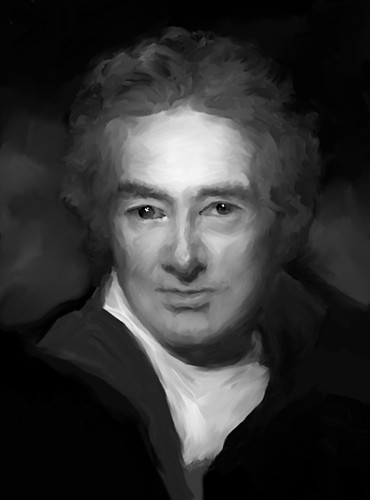
Public Service as a Holy Calling
The Life of William Wilberforce
If we define patriotism as the dangerous and domineering tendency to promote not the nation’s well-being, but its glory at the cost of other nations, a tendency that leads to oppression and conquest, then we would have to say that Christianity is an enemy of patriotism. But if we understand patriotism to give us a love for our own land, a love that never confines our concern for humanity to our political boundaries, then Christianity gives us abundant encouragement to this brand of patriotic feeling.” – William Wilberforce
If we find that we are well-liked and popular, then we should think that we have got more than we bargained for – and then watch ourselves all the more carefully for fear we become too fond of something that we will soon be asked to give up. We need to consider often that worldly fame never lasts; we may all have to submit ourselves sooner or later to disgrace and criticism, so that we are not taken by surprise. We need to cultivate in our hearts the desire for “that honour which cometh from God,” for this is the most effective means of bringing our thoughts into perspective in regards to the love of human approval.” – William Wilberforce
In the Bible we learn the painful lesson of human degradation and unworthiness. We learn that humility and contrition are the emotions best suited to our fallen condition and most acceptable in the sight of our Creator. In addition, we learn that we should habitually cherish and cultivate these feelings, while we put off our arrogance and self-importance. We are to studiously maintain a continual sense that any natural advantages we may have over others means nothing in God’s eyes; instead, His love for us depends totally on His own unmerited mercy.” – William Wilberforce
Mortify the flesh, with its affections and lusts,” is the Christian rule, but most modern Christians practice a soft luxurious life of habitual indulgence. We seem to think that a healthy disciplined self-denial went out of style years ago along with the austerities once practiced in monasteries. Christianity calls us to a state of alert diligence and active service.” – William Wilberforce
It is amazing to ponder the fact that these thoughts were penned two Centuries ago, for they speak eloquently to the time we live in.
(to be continued)

SPECIAL REPORT: Cow Heads and Coronavirus
Cow Heads and Coronavirus
Around 1768, English physician John Fewster observed that people who had been infected with Cowpox didn’t get Smallpox. It was a Dorset farmer, Benjamin Jesty, who actually vaccinated his family with cowpox during a smallpox epidemic in 1774. They did not get smallpox. Jaques Antoine Rabaut-Pommier of France also is said to have observed the connection. Dr. Edward Jenner developed the hypothesis for vaccination and performed the first clinical trial, vaccinating 8 year old James Phipps on May 14, 1796. Jenner subsequently exposed the boy to smallpox on two occasions and he remained healthy. The terms vaccine and vaccination are derived from the Latin Variole Vaccine (smallpox of the cow). To this day, the name of the process gives honor to the beast in which the connection was first observed. You might think, from truncated modern history, that the vaccine was a great success and Jenner was immediately lauded. Not so. The media and the medical establishment did not rush to embrace Jenner’s work. A newspaper cartoon by James Gilray, published in 1802, shows vaccinated people sprouting cow heads from their bodies. It took until 1840 for the Royal Society to fully accept vaccination. (read more)
The [Amazing] Grace Option
A Model for the Church Today
[click to read]
By Bob Kirchman
Rod Dreher, [1.] in a new book is promoting what he calls The Benedictine Option as the direction the church should take today. The Benedictines, followers of the man who would become St. Benedict sought as the Roman Empire declined “How to live life as a whole. Not a life of worldly success so much as one of human success.” But are we living in the last days of Rome? Certainly philosophers such as Alasdair MacIntyre [2.] can draw parallels, suggesting that the creation of smaller communities is essential for the preservation of the Faith. New Monasticism has been around for a while. Its desire is to preserve the vitality of true Christian Faith in a culture that is hostile to it and somehow be an influence to those outside its walls toward the light of the Divine.
William Wilberforce has been the subject of a series of essays I have recently written... mainly around his own quotes; and I suggest that his world was actually not at all different from the world we live in today. Britain had become the greatest empire in the world and as such was also sinking into softness and depravity, Wilberforce himself was the son of a prosperous merchant and had no need to worry about providing for himself. He partied his way through school and entered a career in politics. He cared nothing for righting any wrongs or performing any great works. But the young Member of Parliament went on to find Faith and the rest is history. (read more)

Dogwood Flower. Photo by Bob Kirchman
Monuments to Washington
Paintings by Bob Kirchman
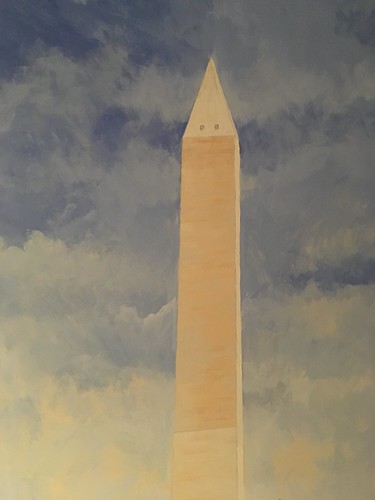
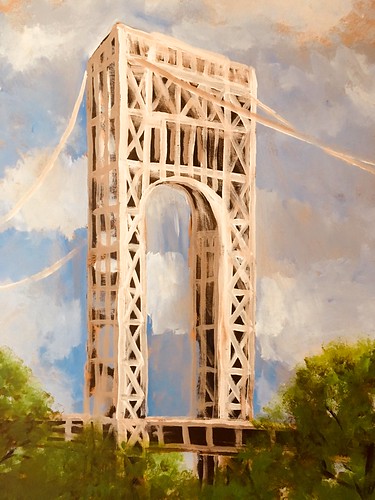
Top: Inscribed in the Capstone of the Washington Monument are the words: "LAUS DEO," meaning "Glory to G-d!" Above: The Roman Arched Towers of the George Washington Bridge were originally designed to be faced with granite. The bridge was built during the Great Depression and the granite was not installed as it was considered an unnecessary expense.
Will America Reunify?
Around 1768, English physician John Fewster observed that people who had been infected with Cowpox didn’t get Smallpox. It was a Dorset farmer, Benjamin Jesty, who actually vaccinated his family with cowpox during a smallpox epidemic in 1774. They did not get smallpox. Jaques Antoine Rabaut-Pommier of France also is said to have observed the connection. Dr. Edward Jenner developed the hypothesis for vaccination and performed the first clinical trial, vaccinating 8 year old James Phipps on May 14, 1796. Jenner subsequently exposed the boy to smallpox on two occasions and he remained healthy. The terms vaccine and vaccination are derived from the Latin Variole Vaccine (smallpox of the cow). To this day, the name of the process gives honor to the beast in which the connection was first observed. You might think, from truncated modern history, that the vaccine was a great success and Jenner was immediately lauded. Not so. The media and the medical establishment did not rush to embrace Jenner’s work. A newspaper cartoon by James Gilray, published in 1802, shows vaccinated people sprouting cow heads from their bodies. It took until 1840 for the Royal Society to fully accept vaccination. (read more)
The [Amazing] Grace Option
A Model for the Church Today
[click to read]
By Bob Kirchman
Rod Dreher, [1.] in a new book is promoting what he calls The Benedictine Option as the direction the church should take today. The Benedictines, followers of the man who would become St. Benedict sought as the Roman Empire declined “How to live life as a whole. Not a life of worldly success so much as one of human success.” But are we living in the last days of Rome? Certainly philosophers such as Alasdair MacIntyre [2.] can draw parallels, suggesting that the creation of smaller communities is essential for the preservation of the Faith. New Monasticism has been around for a while. Its desire is to preserve the vitality of true Christian Faith in a culture that is hostile to it and somehow be an influence to those outside its walls toward the light of the Divine.
William Wilberforce has been the subject of a series of essays I have recently written... mainly around his own quotes; and I suggest that his world was actually not at all different from the world we live in today. Britain had become the greatest empire in the world and as such was also sinking into softness and depravity, Wilberforce himself was the son of a prosperous merchant and had no need to worry about providing for himself. He partied his way through school and entered a career in politics. He cared nothing for righting any wrongs or performing any great works. But the young Member of Parliament went on to find Faith and the rest is history. (read more)

Dogwood Flower. Photo by Bob Kirchman
Monuments to Washington
Paintings by Bob Kirchman


Top: Inscribed in the Capstone of the Washington Monument are the words: "LAUS DEO," meaning "Glory to G-d!" Above: The Roman Arched Towers of the George Washington Bridge were originally designed to be faced with granite. The bridge was built during the Great Depression and the granite was not installed as it was considered an unnecessary expense.
Will America Reunify?
[click to read]
By Dennis Prager
Calls for unity sure sound nice—if only they were sincere. Total submission to the left is their desire: "Submit to us and we'll be unified; don't and you'll be punished." (click to read)
Isambard Kingdom Brunel
Faith and Beauty IV
Seeing the Divine in the Creation
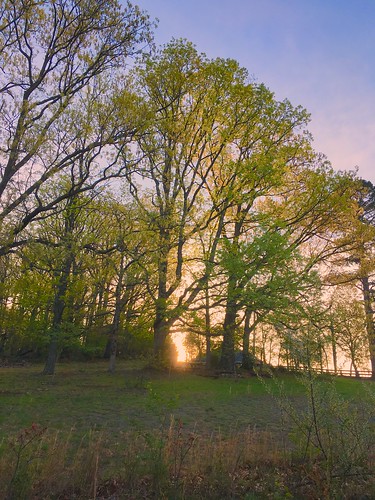
For ye shall go out with joy, and be led forth with peace: the mountains and the hills shall break forth before you into singing, and all the trees of the field shall clap their hands.” – Isaiah 55:12
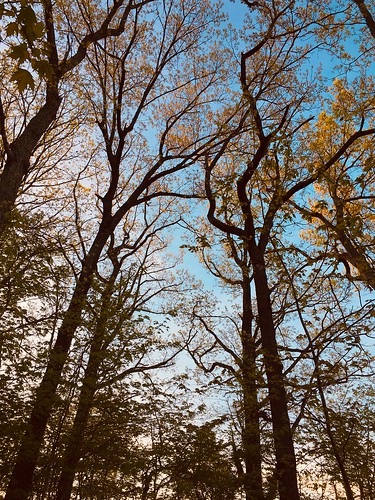
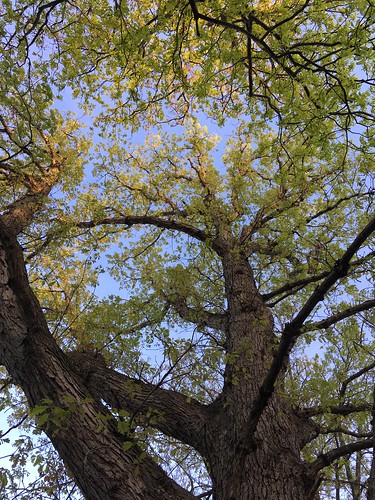
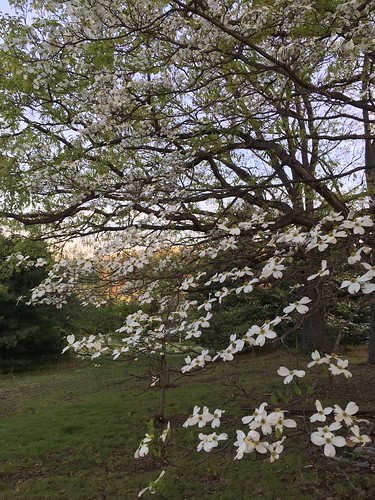


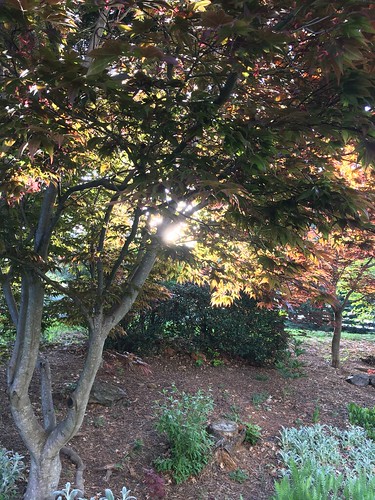
Photos by Bob Kirchman.
“What Imprints Will You Leave in the Sands...”
[click to read]
What Imprints Will You Leave in the Sands of History” Here is the story of a movement – a journey on “The Road Less Traveled.” The accomplishments and aspirations of the past few years are recounted here. May we never forget them. (read more)

Isambard Kingdom Brunel
Faith and Beauty IV
Seeing the Divine in the Creation

For ye shall go out with joy, and be led forth with peace: the mountains and the hills shall break forth before you into singing, and all the trees of the field shall clap their hands.” – Isaiah 55:12






Photos by Bob Kirchman.
“What Imprints Will You Leave in the Sands...”
[click to read]
What Imprints Will You Leave in the Sands of History” Here is the story of a movement – a journey on “The Road Less Traveled.” The accomplishments and aspirations of the past few years are recounted here. May we never forget them. (read more)
